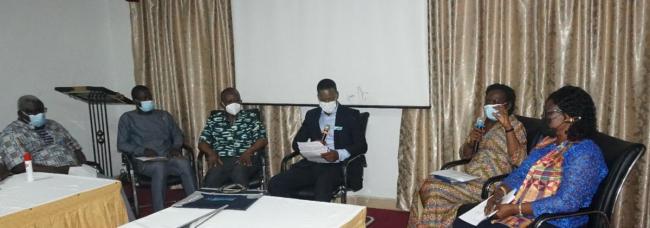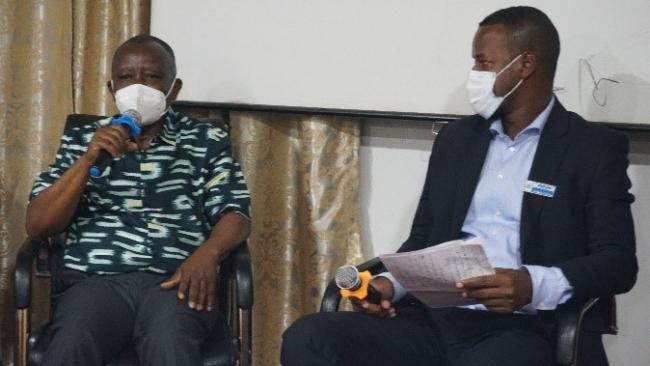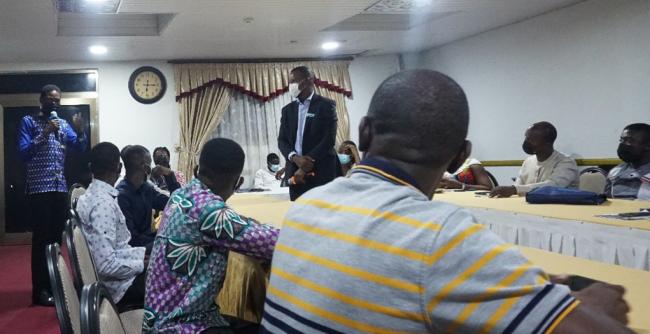The side-session on equity and inclusion was opened with a short video documentary on reaching the hard-to-access communities and schools in Asutifi North District of the Ahafo Region of Ghana.
Published on: 08/12/2021
IRC Ghana in collaboration with the coalition of NGOs in water and sanitation (CONIWAS) and equity and inclusion champions convened a talk-show side event on the theme, ‘Strong WASH system needs equitable and inclusive effort to deliver the SDG targets’ at the 32nd edition of the Mole Water Sanitation and Hygiene (WASH) conference on November 3, 2021, in Ejisu near Kumasi in the Ashanti Region of Ghana.

Vida Duti, IRC Ghana Country Director stated in her opening comments as one of the expert panel discussants, “ensuring universal access to safe and affordable WASH for all by 2030 requires strong WASH systems to deliver the targets. And strong WASH systems rely on equitable and inclusive multiple actors to deliver safe and sustainable WASH services to everyone.” She used the analogy of a radio set that requires functional parts to be fully operational to further explain the WASH system, stating that the relevant building blocks need to be in place and strengthened to enable the delivery of WASH services to all.
“This interactive talk show session with sector champions helps to practically unpack equity and inclusion issues within the context of WASH systems strengthening, share experiences and reflect on how to reach the hard-to-reach and the excluded; and also what various actors need to know and do to ensure inclusive advance towards universal access - leaving no one behind,” Vida added.
To set the context for the one-and-half hour side session, a short video documentary on reaching the hard-to-access communities and schools in Asutifi North District of the Ahafo Region of Ghana was shown, highlighting the WASH situation of the excluded schools and communities and the drive under the Asutifi North Ahonedia Mpuntuo (ANAM) initiative to achieve services for everyone by 2030.

Umaru-Sanda Amadu, a popular local radio and television presenter with Accra based CitiFM/ TV facilitated the follow-up expert panel talk show featuring Yaw Obeng-Poku, Director at the Ministry of Sanitation and Water Resources; Vida Duti, IRC Country Director; Awudu Modoc, Executive Director, Afram Plains Development Organisation; Victoria Norgbey, Executive Director, Apex Body of Women in Poultry Value Chain; and Emmanuel Marfo, CEO of Global Alliance for Development Foundation.
The talk-show delved into WASH sector progress status, the WASH system, equity and inclusion in WASH issues - barriers to inclusion and what it takes to bridge the gaps. The session also elicited expert panel perspectives to deepen awareness and interest around the challenges of inclusion to inform the advocacy for all-inclusive WASH prioritisation and action towards achieving Sustainable Development Goal 6.
The discussants acknowledged that Ghana is making steady progress towards achieving the WASH targets and a range of social protection and inclusion programmes developed and being implemented, and that lingering exclusions and equity issues indicate the need to intensify more targeted and harmonised advocacy efforts towards establishing inclusive and resilient delivery mechanisms for WASH services to all – including hard-to-access communities and inner-city residents.
The session reflected on the commitment of the country to achieving universal and equitable access to safe and affordable drinking water for all – noting that a safely managed drinking water service is from an improved source that is located on premises, available when needed and free from contamination. It was admitted that unless deliberate and inclusive measures are taken to accelerate accessibility on premises whilst reaching the hard-to-access communities, achieving safely managed and universal coverage targets may prove difficult.

The interactive session called for, i) an appropriate and innovative mix of water supply technologies and user-friendly delivery methods to be deployed in hard-to-access communities to provide safe water to everyone in an equitable manner; ii) a systems approach backed by enabling environment is needed to entice and motivate social enterprises and private sector investments and partnerships to accelerate WASH service delivery to all; iii) continuous community sensitisation on issues of equity and inclusion and periodic capacity enhancement of water and sanitation management teams for effective operation and maintenance of water facilities; and iv) research, innovation and learning on good inclusion practices, models, approaches and technologies should be documented and promoted for uptake and replication.
The side session further called on the Ministry of Sanitation and Water Resources to consider equity and inclusion issues in the ongoing sector policy reviews; revise the Ghana WASH sector gender mainstreaming guidelines and toolkit; and to co-ordinate the roll-out training and mainstreaming into WASH plans and processes at all levels.
In his short remarks, Attah Arhin, chairman of CONIWAS assured participants that matters arising from the discussions and the recommendations made will inform the conference communiqué. He pledged the commitment of the coalition in working with partners like IRC to uphold issues of inclusion, empower citizens and collectively advocate for the elimination of barriers to social inclusion.
Umaru-Sanda Amadu brought the session to a close with a call on participants to continue to reflect as individuals and institutions on how to ensure inclusive advance towards universal access bearing in mind that - “Inclusion is not just about improving access to services for those who are currently excluded but also empowering people to engage in wider processes of decision making to ensure that their rights and needs are recognised."
About fifty (50) stakeholders drawn from local and national government institutions, private sector, research institutions, local and international NGOs, and the media were at the side event. Overall, the side event was considered by most participants as very interactive and revealing.